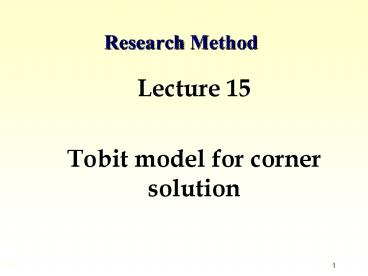Research Method - PowerPoint PPT Presentation
1 / 26
Title:
Research Method
Description:
Research Method Lecture 15 Tobit model for corner solution * The corner solution responses Corner solution responses example 1 Amount of charitable donation: Many ... – PowerPoint PPT presentation
Number of Views:105
Avg rating:3.0/5.0
Title: Research Method
1
Research Method
- Lecture 15
- Tobit model for corner solution
2
The corner solution responses
- Corner solution responses example
- 1 Amount of charitable donation Many people
do not donate. Thus a significant fraction of the
data has zero value. - 2. Hours worked by married women Many married
women do not work. Thus, a significant fraction
of the data has zero hours worked.
3
- Tobit model is used to model such situations.
4
The model
- For the explanatory purpose, I use one
explanatory variable model. This can be extended,
off course, to multiple variable cases.
5
- Consider to estimate the effect of education x on
the married womens hours worked y. - In tobit model, we start with a latent variable
y, which is only partially observed by the
researcher - yß0ß1xu and uN(0,s2)
- If y is positive, then y is equal to the
actual hours worked y. But if y is negative,
then the actual hours worked, y, is equal to
zero. We also assume u is normally distributed.
6
- The model can be conveniently written as
- yiß0ß1xiui ..(1)
- such that
- yiyi if yigt0
- yi0 if yi0
- and
- uiN(0,s2)
- We introduced i-subscript to denote ith
observation. We assume that equation (1)
satisfies the Classic Linear Model assumptions.
The actual hours worked.
7
Graphical illustration
y, y
When y is negative, actual hours worked is zero.
Educ
8
- The variable, y, can be negative, but if it is
negative, then the actual hours worked is equal
to zero. - In this way, the Tobit model deals with the fact
that, many women do not work, thus,the hours
worked is zero many women .
9
The estimation procedure
- The estimation procedure is by maximum likelihood
estimation. - If the hours worked is positive (i.e., for the
women who are working), yiyi, thus - ui yi- ß0ß1xi
- Thus, the likelihood function for a working
woman is given by the hight of the density
function
10
- If the actual hours worked is zero (i.e., for
women who are not working), we only know that
y0. Thus, the likelihood contribution is the
probability that y0, which is given by
11
- To summarize,
- Let Di be a dummy variable that takes 1 if yigt0.
Then, the above likelihood contribution can be
written as.
12
- The likelihood function, L, is obtained by
multiplying all the likelihood contributions of
all the observations. - The values of ß0,ß1 and s that maximize the
likelihood function are the Tobit estimators of
the parameters. - In actual computation, you maximize Log(L).
13
Exercise
- Using Mroz.dta, estimate the hours worked
equation for married women using Tobit model.
Included in the model, nwifeinc, educ, exper,
expersq, age kidslt6, kidsge6.
14
Answer
15
The partial effects (marginal effects)
- As can be seen, estimated parameters ßj measures
the effect of xj on y. - But in corner solution, we are interested in the
effect of xj on actual hours worked y. - In the next few slides, I will show how to
compute the effect of an increase in explanatory
variable on the expected value of y.
16
- Note that the expectation of y given x is given
by - E(yx)P(ygt0)E(yygt0,x)
- P(y0)E(0y0,x)
- P(ygt0)E(yygt0,x) ..(1)
- Now, let me compute E(yygt0,x).
zero
17
- Now, we use the fact that if v is a standard
normal variable and c is a constant, then - In our case, c-(ß0ß1x). (Note that the
expectation is also conditioned on x, so you can
treat x as a constant.). Thus, we have
18
This term is called the inverse Mills ratio, and
denoted by ?(.)
Now, let me compute P(ygt0x)
19
- By plugging (2) and (3) into (1), we have
20
- From the above computation, you can see that
there can be two ways to compute the partial
effect.
The effect of x on hours worked for those who are
working.
The overall effect of x on hours worked.
21
- As can be seen, both partial effects depends on
x. Therefore, they are different among different
observations in the data. - However, we need to know the overall effect
rather than the effect for specific person in the
data. - As was the case in the Probit models or logit
models, there are two ways to compute the
overall partial effect.
22
- The first is the Partial Effect at Average (PEA).
You simply plug the average value of x in the
partial effect formula. This is automatically
computed by STATA. - The second is the Average Partial Effect. You
compute the partial effect for each individual in
the data, then take the average.
23
Exercise
- Using Mroz.dta, estimate the hours worked
equation for married women using Tobit model.
Included in the model, nwifeinc, educ, exper,
expersq, age kidslt6, kidsge6. - 1. Compute the effect of education on hours
worked for those who are currently working
- 2. Compute the effect of education on hours
worked for the entire observations
24
Partial effect at average for working women
Computing manually.
25
Partial effect at average for working women
Compute automatically.
26
Partial effect at average for all the obs
Compute manually.
Partial effect at average for all the obs
Compute automatically































